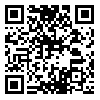BibTeX | RIS | EndNote | Medlars | ProCite | Reference Manager | RefWorks
Send citation to:
URL: http://ijpcp.iums.ac.ir/article-1-269-en.html
Abstract
Objectives: In this study was the relationship of alexithymia with the emotional expression styles (emotional expressiveness, emotional control, and ambivalence over emotional expressiveness) and general health investigated among university students. The effect of gender on alexithymia is also studied.
Method: A total of 210 university students (105 female, 105 male) from Guilan University were selected using a multi-stage randomized sampling method and were assessed by the Toronto Alexithymia Scale Emotional Expressiveness Questionnaire, Emotional Control Ques-tionnaire, Ambivalence over Emotional Expressiveness Questionnaire, and General Health Questionnaire. Data were analyzed using descriptive statistics, t-test, Pearson’s correlation coefficient, and regression analysis.
Results: Alexithymia was significantly correlated with all emotional control subscales: significantly positive correlation with the emotional inhibition and rumination subscales (p<0.01), and significantly negative correlation with the aggression control and benign control subscales (p<0.01). Alexithymia had also a significantly direct correlation with the style of ambivalence over emotional expressiveness (p<0.01). The results revealed a significant correlation between alexithymia and the total score of General Health Questionnaire. There was no significant difference between the female and male students with regards to the level of alexithymia.
Conclusion: Alexithymia is a stronger indicator for the general health variance than the style of ambivalence over emotional expressiveness. More alexithymic states are associated with decreased general health.
Received: 2007/11/18 | Published: 2007/11/15
| Rights and permissions | |
 |
This work is licensed under a Creative Commons Attribution-NonCommercial 4.0 International License. |



